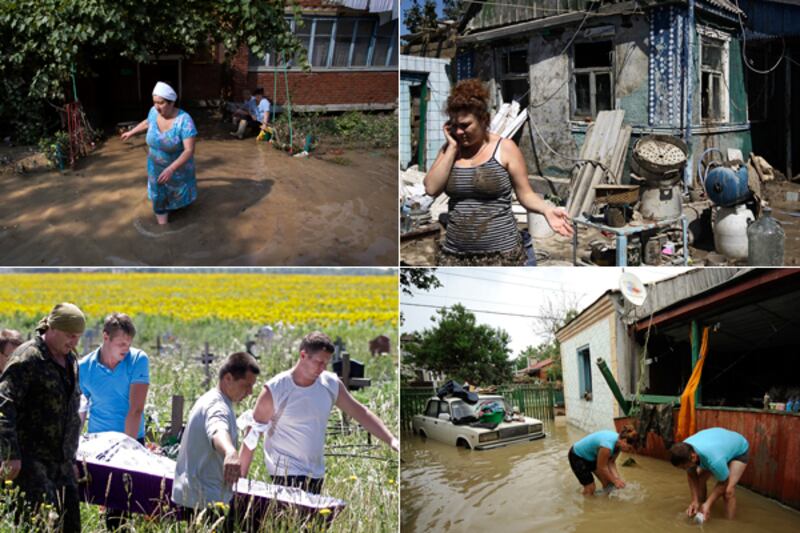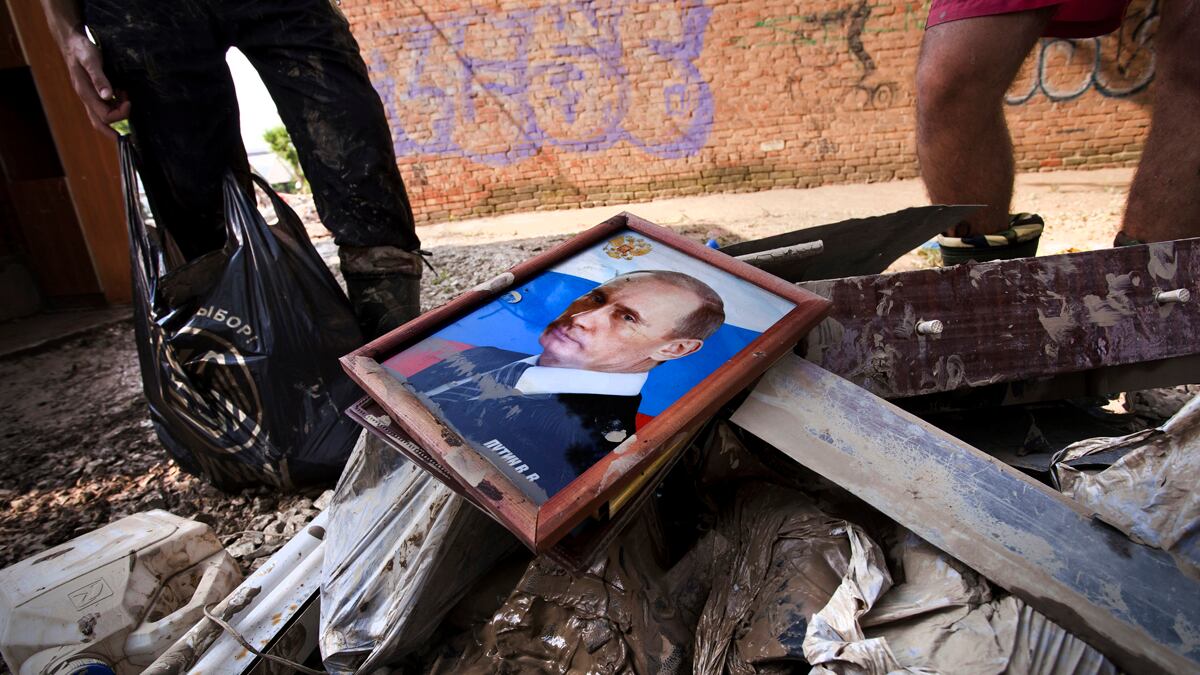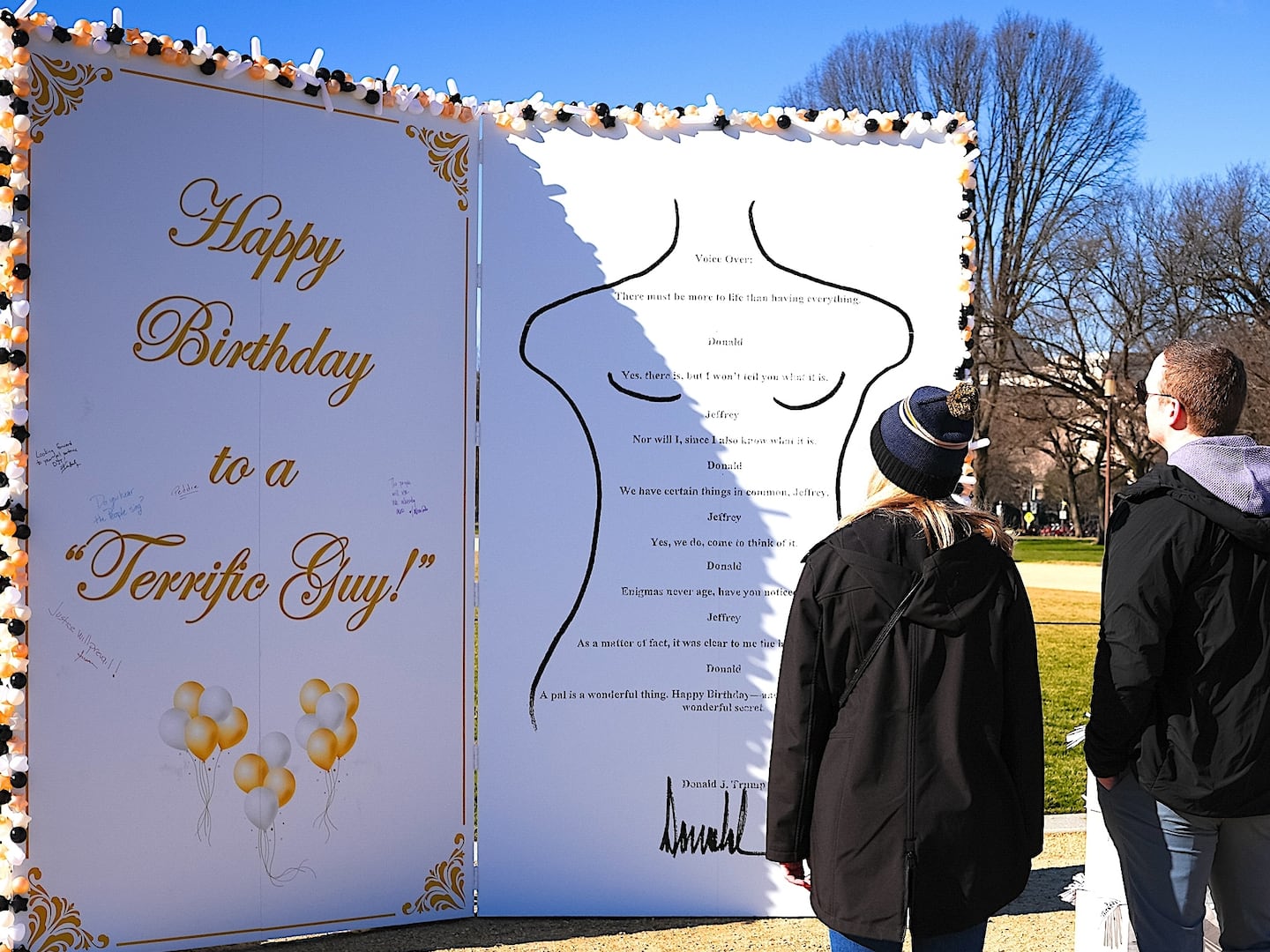Russia is a disaster-prone place. Crumbling Soviet-era infrastructure, shoddy building, poor engineering and widespread corruption among the authorities charged with maintaining safety standards all make major disasters a terribly inevitable–and terribly regular–Russian ritual. Over the last twelve months alone more than a hundred people were killed when a pleasure boat capsized, three planes crashed–including one transporting a popular hockey team-and an oil rig capsized.

Floods that swept the South Russian region of Krasnodar over the weekend are the latest disaster to befall the country. Torrential rains last Saturday night caused two small rivers near the town of Krymsk to burst their banks and a reservoir to overflow, trapping people in their houses and sweeping away roads, fences and vehicles. The official death toll now stands at 171, but that’s expected to rise as rescuers dig more bodies out of the mud.
What’s different about this latest disaster, though, is that it’s the first since a remarkable upsurge in opposition to Vladimir Putin, which began last winter– and a wave of civic awareness and activism that has followed. Laying the blame for all possible disasters on the Kremlin is nothing new –whether they are man-made, such as the sinking of the Kursk submarine in 2000, which killed 118, or natural, such as the wildfires in Central Russia two years ago, which burned more than 20 villages. But the criticism of the authorities’ response to this week’s flooding, both from local victims and from internet-savvy Muscovites, shows that confidence in the authorities–any authorities–has sunk to new lows.
“There is a problem of distrust," says Olga Kryshtanovskaya, a leading sociologist and member of the Duma. "This distrust has grown rapidly since the Duma elections in December. The regime is in a situation where it cannot function as before."
Russia’s television media–a central plank of the Kremlin’s control of Russian public opinion–dutifully reported the heroic efforts of local authorities to battle the flood’s aftermath. But the Russian Internet, used by some 60 million people, or nearly half the population, was brimming with stories of negligence and incompetence. One Internet meme, widely believed despite strenuous official denials, was that the flooding was caused by officials opening the sluices of a local water reservoir. Another rumor distributed on Russian social networks like vKontakte and ‘odnoklassniki,’ was that the death toll stood in the thousands rather than the official estimate of less than 200–a claim also denied by the authorities.
After the flood, Vladimir Putin was quickly on the scene (as he usually is in such situations), touring the area from a plane. Russia’s Channel One news showed Putin telling local officials that “a top investigator will be appointed to find out who did what.” But, in a sign that Kremlin authorities are nervous about a spike in popular anger, Putin was kept well away from ordinary victims. An angry crowd mobbed Krasnodar region governor Alexander Tkachev on Sunday, yelling at him and complaining that there had been no flood warning.

Back in 2005, former U.S. President George W. Bush saw his credibility as a leader and crisis manager seriously compromised after the government’s chaotic response to Hurricane Katrina. But the Krasnodar floods are unlikely to serve as Putin’s Katrina moment–if only because the Kremlin’s control of the traditional media remains so tight. New laws being prepared in the Duma by Putin loyalists seek to extend that control over the Internet, too, most notably by making defamation a criminal offense punishable by a maximum fine of $15,000 or up to five years in prison.
Dmitry Medvedev, Russia’s former president, removed this article from the criminal code a year ago, reducing defamation to an administrative offense punishable by a fine of only $90. But now with Putin back at the Kremlin, the authorities are preparing a full-scale assault on Russians’ right to protest—both in person and on the web—through draconian new fines. Already several bloggers in the Russian provinces have been prosecuted on charges of extremism in cases widely seen as a trial-run for the new anti-defamation laws.
Yet despite all attempts to buttress his popularity by force, Putin’s reputation is steadily slipping. A survey by the Levada Center in Moscow (released before the latest floods) asked people to rate President Putin on his supposed qualities. The survey found that favorable opinions of the Russian leader are sliding badly among all social groups. In June, 39 percent of Russians said they considered Putin "business-like," down from 62 percent in 2008. Even Putin's strongest suit, "strong-willed and courageous" has dropped to 18 percent from its peak at 34 percent and his "charming" rating is down to 7 percent from 32. The Krasnoyarsk disaster is likely to erode that support further.
One perhaps unexpected effect of the winter’s opposition rallies, however, has been an upswing in civic activism. “What struck me most was that I have never seen so many volunteers,” wrote Ren-TV journalist Leonid Kanfer, a veteran of many Russian disasters, from Krymsk in his blog. “People are coming here in their own cars. They bring toothbrushes, toilet paper, oats, clothes. They take time off work, they buy rubber boots and come here to help clean up. Just like that, not hoping for any recognition.”
A Facebook appeal in Moscow yielded ninety tons of donated supplies in just 48 hours, a remarkable feat in a country with little tradition of charity. In other words, people’s trust in the authorities is eroding. But it’s being replaced, in part at least, by trust in each other.






